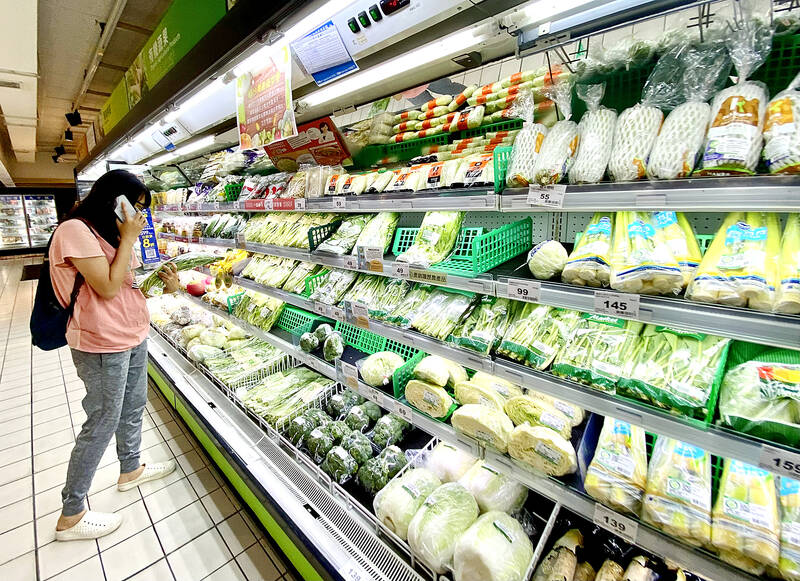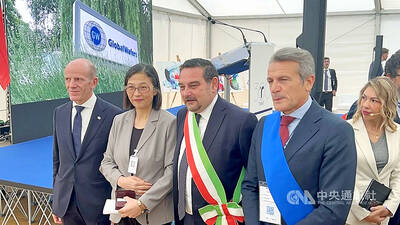The consumer price index (CPI) last month rose 2.36 percent, slowing from 2.53 percent in July, as the impact of Typhoon Gaemi drove up vegetable and fruit prices, the Directorate-General of Budget, Accounting and Statistics (DGBAS) said yesterday.
It is the fourth straight month that the headline inflation has gone above the central bank’s 2 percent target, suggesting continued price pressures though the growth has lost momentum, DGBAS official Tsao Chih-hung (曹志弘) said.
“The CPI would likely display a flattened trajectory this month as the vegetable output is recovering quite smoothly,” Tsao said.

Photo: CNA
Headline CPI inched up by 0.4 percent from a month earlier which indicated a 0.07 percent rise after seasonal adjustments, the agency said.
Core CPI, a more reliable long-term price tracker excluding volatile items, increased by 1.8 percent last month, remaining under 2 percent for five straight months and affirming a stable price trend, it said.
Food costs, the largest chunk of the CPI weighting, rose 4.64 percent from a year earlier, as fruit and vegetable prices surged 24.16 and 11.92 percent respectively due to supply disruptions, Tsao said.
At the same time, dining costs rose 2.9 percent, but have stayed below 3 percent since April, indicating inflationary pressures are easing, he said.
Medicine and healthcare prices, a main inflation driver this year, rose by 3.18 percent as hospitals and clinics raised registration, treatment and drug charges to accommodate higher personnel and operating costs, the agency said.
Rent costs rose 2.27 percent as summer electricity and home repair costs increased and landlords raised rents, while miscellaneous items increased 1.95 percent mainly because jewelry and personal accessory prices rose in line with international gold prices, it said.
Education and entertainment prices increased 1.79 percent, as travel agencies raised prices for overseas tours, while domestic recreational facilities charged higher admission fees, it said.
The producer price index (PPI), which measures the price movements of goods from a seller’s perspective, increased 1.44 percent, down from a revised 3.66 percent uptick in July, the agency said.
The price movements came after raw materials became more expensive, while international fuel prices softened, it said.
The CPI climbed by an average of 2.32 percent in the first eight months of the year while the PPI rose 1.67 percent, it said.

RECYCLE: Taiwan would aid manufacturers in refining rare earths from discarded appliances, which would fit the nation’s circular economy goals, minister Kung said Taiwan would work with the US and Japan on a proposed cooperation initiative in response to Beijing’s newly announced rare earth export curbs, Minister of Economic Affairs Kung Ming-hsin (龔明鑫) said yesterday. China last week announced new restrictions requiring companies to obtain export licenses if their products contain more than 0.1 percent of Chinese-origin rare earths by value. US Secretary of the Treasury Scott Bessent on Wednesday responded by saying that Beijing was “unreliable” in its rare earths exports, adding that the US would “neither be commanded, nor controlled” by China, several media outlets reported. Japanese Minister of Finance Katsunobu Kato yesterday also

‘DRAMATIC AND POSITIVE’: AI growth would be better than it previously forecast and would stay robust even if the Chinese market became inaccessible for customers, it said Taiwan Semiconductor Manufacturing Co (TSMC, 台積電) yesterday raised its full-year revenue growth outlook after posting record profit for last quarter, despite growing market concern about an artificial intelligence (AI) bubble. The company said it expects revenue to expand about 35 percent year-on-year, driven mainly by faster-than-expected demand for leading-edge chips for AI applications. The world’s biggest contract chipmaker in July projected that revenue this year would expand about 30 percent in US dollar terms. The company also slightly hiked its capital expenditure for this year to US$40 billion to US$42 billion, compared with US$38 billion to US$42 billion it set previously. “AI demand actually

Jensen Huang (黃仁勳), founder and CEO of US-based artificial intelligence chip designer Nvidia Corp and Taiwan Semiconductor Manufacturing Co (TSMC, 台積電) on Friday celebrated the first Nvidia Blackwell wafer produced on US soil. Huang visited TSMC’s advanced wafer fab in the US state of Arizona and joined the Taiwanese chipmaker’s executives to witness the efforts to “build the infrastructure that powers the world’s AI factories, right here in America,” Nvidia said in a statement. At the event, Huang joined Y.L. Wang (王英郎), vice president of operations at TSMC, in signing their names on the Blackwell wafer to

Taiwan-based GlobalWafers Co., the world’s third largest silicon wafer supplier, on Wednesday opened a 12-inch silicon wafer plant in Novara, northern Italy - the country’s most advanced silicon wafer facility to date. The new plant, coded “Fab300,” was launched by GlobalWafers’ Italian subsidiary MEMC Electronics Materials S.p.A at a ceremony attended by Taiwan’s representative to Italy Vincent Tsai (蔡允中), MEMC President Marco Sciamanna and Novara Mayor Alessandro Canelli. GlobalWafers Chairwoman Doris Hsu (徐秀蘭) said the investment marked a milestone in the company’s expansion in Europe, adding that the Novara plant will be powered entirely by renewable energy - a reflection of its